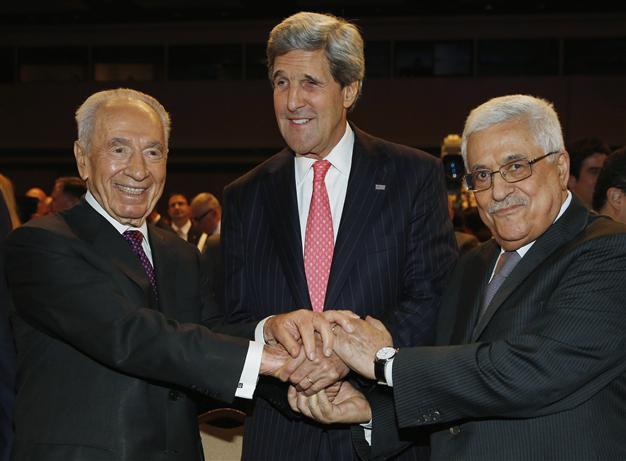Kerry unveils $4 billion Palestinian investment plan
AL SHUNAH, Jordan - Agence France-Presse

U.S. Secretary of State John Kerry, center, Israeli President Shimon Peres, right, and Palestinian President Mahmoud Abbas all shake hands during the World Economic Forum on the Middle East and North Africa at the King Hussein Convention Centre at the Dead Sea in Jordan Sunday May 26, 2013. AP Photo
US Secretary of State John Kerry unveiled Sunday a plan to boost the Palestinian economy by attracting $4 billion in private investment, saying it could transform the lives of the people.
As he seeks to bring Israel and the Palestinians back to the table to negotiate a peace deal, Kerry said it was also imperative to create jobs and meet the hopes of young people for a better economic future.
He has tasked Tony Blair, the Quartet's special envoy to the Middle East, with drawing up a plan to revitalise the West Bank through boosting industries such as tourism, construction, information technology and agriculture.
Blair's plan, being aided by some global business leaders who are giving their time free, could be "ground-shaking," Kerry said.
The group was putting together recommendations for the Palestinian leadership to decide on, aiming to "mobilise some $4 billion of investment".
"These experts believe we will increase the Palestinian GDP by as much as 50 percent over three years," Kerry told the closing session of the World Economic Forum meeting on the shores of the Dead Sea in Jordan.
"The most optimistic estimates foresee enough new jobs to cut unemployment by two-thirds to eight percent down from 21 percent and to increase the median wage by 40 percent," said the top US diplomat.
Some 100,000 jobs in home construction alone could be created in the next three years, while tourism could triple.
While details of the plan remained sketchy, Blair's office said in statement they were "analyzing the potential of various sectors of the Palestinian economy and identifying measures that could be taken to spur transformative growth." They were "consulting with a number of key international and local experts and stakeholders from the different economic sectors" and would provide details "in due course," it added.
Kerry warned the forum however it stood before a historic moment, amid the yearnings for greater economic and social freedoms unleashed by the Arab Spring.
"We ignore the lessons of the Arab awakening at our own peril... it is imperative that all of us channel our creativity and energy into making sure that people do actually have better choices," he said.
He urged public and private sectors to work together saying they each "have a responsibility to meet the demands of this moment and one can't do it without the other. We need you at the table".
"If we don't eagerly grab this moment we will condemn ourselves to a future conflict. We are staring down a dangerous path filled with potential violence, with the capacity to harden divisions, increase instability. And this will be a path filled by violent extremists who rush to fill the vacuum." In a separate initiative unveiled at the forum in the Jordanian town of Al Shunah, some 300 Israeli and Palestinian business executives also urged their governments to move towards a two-state solution.
The Breaking the Impasse Initiative vowed to use their influence to convince leaders on both sides to resume serious talks, stalled since late 2010.
"The current situation endangers the economy and the social fabric of both nations, and may render the two-state solution unattainable," it said in a statement.
Israeli President Shimon Peres urged Palestinian leader Mahmud Abbas, who was sitting in the same front row of chairs, to "return to negotiations as soon as possible and bring peace".
"President Abbas, you are our partner and we are yours," the Nobel Peace laureate said, adding that he was the gaps between the two sides could be bridged.
Abbas also called for young Palestinians to be given hope of a better future, and said his people "want to live with neighbours who we respect and they respect us also".
But in a sign of the wide divisions, Abbas stressed he would not take the issue of the return of Palestinian refugees off the negotiating table, and called again for Israel to free prisoners held since before 1993.
Late Sunday, Kerry had a private dinner with the United Arab Emirates Foreign Minister Abdullah bin Zayed, Jordanian Foreign Minister Nasse Judeh, Blair and American businessman Tim Collins.
He was also expected to meet again with Abbas following his trip to Israel and the West Bank last week.
